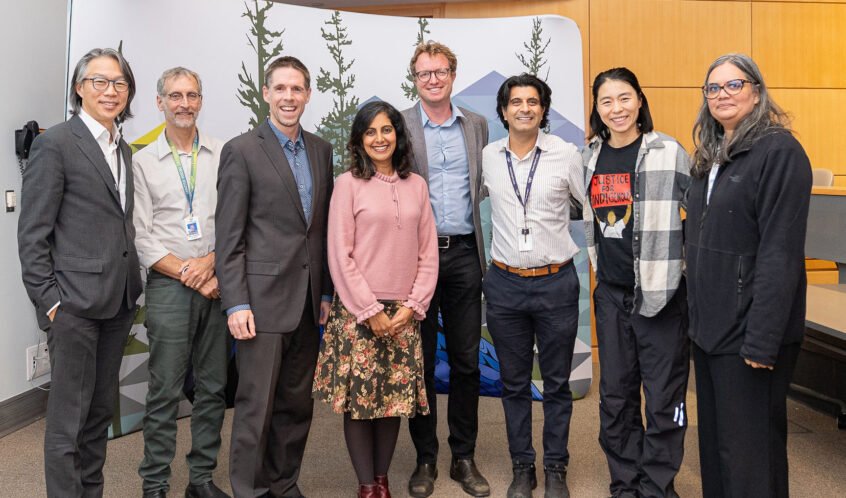We all want to do more for planetary health both personally and professionally. The Vancouver Acute/Vancouver Community Medical Staff Planetary Health Committee is working to make that a little bit easier by launching its Green Enthusiasts Network. The inaugural event provided an overview of current initiatives underway in VA and VC and then encouraged medical staff with ideas for new projects to take advantage of current funding opportunities (see here for the letter of intent). Projects can focus on prevention, stewardship, decarbonization, and adaptability. Funding can be used for sessional payments, meals, venue costs, and/or speaker or consultant fees.
(The committee is also currently mapping various planetary health projects being undertaken at VA and VC. If you have a project you would like to add, please complete this form.)
VCH leaders weigh in
The launch event began with short presentations from VCH leaders VP of Medicine and Academic Affairs Dr. Roger Wong, VP of Strategy, Innovation and Planetary Health Darcia Pope, and Planetary Health Clinician Engagement Lead Dr. Rashmi Chadha.
Dr. Wong, who was unable to attend in person, sent a video message. He emphasized how medical staff initiatives can spark ideas that take root and that he was excited about how quickly planetary health projects can be launched with funding from VPSA. Change is required at both the individual and system level, he said, and noted that health care is more than treating illness. It is about caring for individuals and communities.
Ms. Pope spoke about planetary health at VCH, where it is now embedded as one of the health authority’s four pillars. VCH has three planetary health goals: reduce health-care emissions and achieve zero unnecessary waste, create a climate-resilient system able to withstand acute shocks and chronic stressors, and support communities in both mitigation and adapting to climate change impacts. VCH’s areas of action are service design and delivery, supply chain and business practices, facilities, infrastructure and land use, food and nutrition, and community climate change, mitigation and adaptation.
Dr. Chadha then spoke about ways VCH is seeing planetary health in action. She pointed to a number of publications including Vancouver Coastal Health – Planetary Health Strategy 2024-2029, Protecting Population Health in a Climate Emergency, and the 2024 Vancouver Coastal Health Climate Change Accountability Report. Dr. Chadha also discussed the planetary health menu that was introduced as a pilot project at VGH. The successful recipes are now embedded into the regional core menu at VGH and the program is being expanded to Richmond and Lions Gate hospitals. VCH is developing engagement strategies and community-facing versions of the recipes for patients and staff to make at home. Dr. Chadha also gave the example of the antimicrobial switch project. Current VCH-wide engagement efforts include establishing an engagement advisory group to develop a strategy that will embed planetary health across VCH, and a 2025 crowdsourcing campaign where staff and medical staff share ideas and collective knowledge.
Project presentations by VPSA members
The event was also an opportunity to celebrate planetary health initiatives undertaken in Vancouver Acute and Vancouver Community. Drs. Richard Cook, Harpinder Nagi, Kelly Lau, and Stewart Brown spoke to these.
Dr. Cook’s focus was on “Greener Hospitals Through Multidisciplinary Green Teams.” Concerned by the amount of medical waste in hospitals, he and others have identified colleagues who are passionate about planetary health and who are given responsibility, authority and resources to act. The result is a cardiology green team that includes a project manager along with a clinical manager, physician, charge nurse and ward nurse representatives. The team’s initiatives include encouraging patients to bring their own pillows, a reusable blood pressure cuff project, reducing glove usage, providing reusable water jugs at patients’ bedsides, and providing recycling for soft plastics. Dr. Cook remarked that these are relatively simple ideas to implement but they can have a big impact.
Dr. Nagi and Dr. Lau’s presentation was entitled “From Best Practices to Lasting Change: Use of Low-cardon Inhalers in Acute and Community Settings.”
Dr. Nagi was a member of the Acute care team that worked on the VGH Inpatient Climate Conscious Inhaler Collaboration Project. Working from an idea in a Cascades Canada playbook, the team’s goal was to optimize puffers prescribed and dispensed for better illness management while reducing environmental impact by educating house staff. Throughout the course of the project, 21 inhaler changes were made to benefit patients and the environment. This resulted in the equivalent of reducing carbon emissions by over 400,000 gCO2e (the equivalent of driving almost 2,000 kilometres in a gas-powered car. Dr. Nagi discussed challenges the project faced as well as next steps, noting primarily that collaboration is key as is engaging patients.
Dr. Lau talked about a VC initiative to provide high value and low carbon respiratory care. The project focussed mainly on education and the creation of a toolkit for family doctors. Presentations have been made at four primary care clinics and two Urgent Patient Care Centres with an upcoming presentation at a VCH-wide UPCC meeting.
Dr. Brown’s presentation was on “Balancing Expectations and Driving Sustainable Perioperative Care Projects.” He discussed three recent anesthesiology projects, why they worked, and what their challenges and limitations were. He spoke of the VPSA-funded project using target-controlled infusions to deliver total intravenous anesthesia, as well as mitigating N2O waste, and reducing unnecessary pre-op tests.
Green Enthusiasts Network
Following the presentations, VA/VC Medical Staff Planetary Health Committee Chair Dr. Matthew Bennett shared the committee’s vision for its new planetary health network. The goal is to gather planetary health enthusiasts and champions to share ideas, collaborate, mentor one another, and support one another. This network will begin with VPSA members and eventually spread to incorporate medical staff in VCH, other health authorities, and other jurisdictions.
To that end, the committee is offering project funding to help members bring their ideas to life. Projects could be planetary health talks at the division/department level by members or subject matter experts. Other ideas include creating a local green team, adapting a toolkit to meet local needs, or mentoring a toolkit. Check out the letter of intent to learn how you can get working on your own planetary health passion project.
A recording of the full Green Enthusiasts Network launch is available here. You can view photos from the event here.
Event feedback
Twenty-one of the 66 medical staff members to attend the meeting completed the post-event survey. Respondents gave the event an outstanding net promoter score of 95 with everyone agreeing that the session’s objectives were met.
When asked what resonated most, responses included:
- The need for teamwork, which is good because climate change affects us all.
- Learning about the different projects.
- The inspiring work being done and the results they have been able to track.
- Loved hearing about all the successful projects, plans to expand the network and spread the word. Great positive energy that is making a difference.
- The magnitude and diversity of work being done in this space, largely by volunteers who are committed to the cause. I was beyond inspired.
- The huge reduction in greenhouse gases and savings with simple measures.




